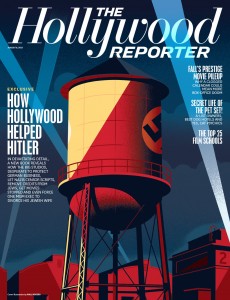 What happens when the most powerful force in the world for shaping public opinion coordinates with the most evil force on earth?
What happens when the most powerful force in the world for shaping public opinion coordinates with the most evil force on earth?
The Hollywood Reporter has a fascinating and scandalous book excerpt about the widespread and paralyzing practice of multiple studios in Tinseltown to kowtow to Nazi censorship during the 1930s. They didn’t want to lose the German market, even as Nazi Germany acted like thugs: Demanding extensive edits, squelching projects, even forcing a MGM studio executive in Germany to divorce his Jewish wife:
Over the next few years, the studios actively cultivated personal contacts with prominent Nazis. In 1937, Paramount chose a new manager for its German branch: Paul Thiefes, a member of the Nazi Party. The head of MGM in Germany, Frits Strengholt, divorced his Jewish wife at the request of the Propaganda Ministry. She ended up in a concentration camp.
The studios also adopted new tactics. When Give Us This Night and The General Died at Dawn were banned, Paramount wrote to the Propaganda Ministry and speculated on what was objectionable in each case. Give Us This Night was scored by a Jewish composer, so the studio offered to dub in music by a German composer instead. The General Died at Dawn had been directed by Lewis Milestone,who had also directed All Quiet on the Western Front, so the studio offered to slash his name from the credits.
All Quiet on the Western Front offended the Nazis because it showed the Germans losing. World War I. Which they did, indeed, lose.
The most shocking and revealing fact is that the most powerful force for shaping opinion in the world, which Hollywood was then as it is now, stayed silent or complicity supported Naziism during the 1930s. Herman J. Mankiewicz, who later wrote Citizen Kane, produced a script called The Mad Dog of Europe, exposing the mistreatment of Jews in Nazi Germany.
It was quashed.
A sequel to All Quiet on the Western Front, The Three Comrades, was changed beyond recognition.
And this was no small feat, for Three Comrades would have been the first explicitly anti-Nazi film by an American studio. At this critical historical moment, when a major Hollywood production could have alerted the world to what was going on in Germany, the director did not have the final cut; the Nazis did.
Shocking indeed. The whole article is worth a read. And you can bet I’ll be reading the book when it comes out September 9: The Collaboration: Hollywood’s Pact with Hitler by Ben Urwand (Harvard University Press).











